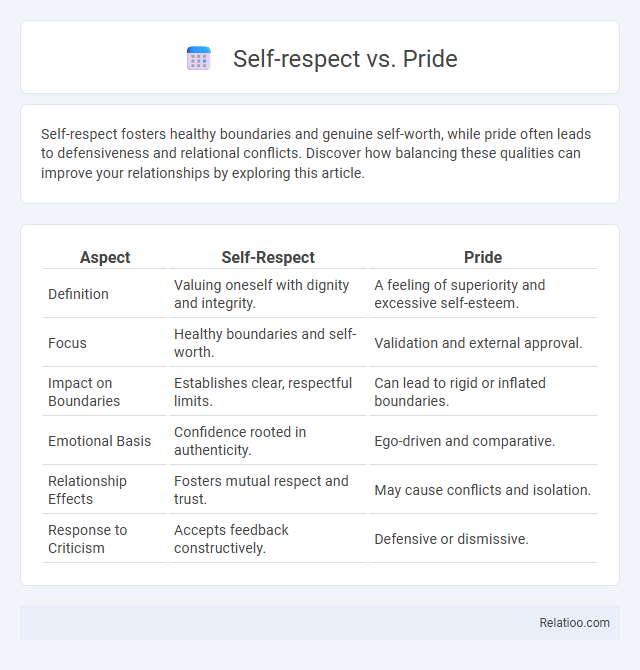Self-respect fosters healthy boundaries and genuine self-worth, while pride often leads to defensiveness and relational conflicts. Discover how balancing these qualities can improve your relationships by exploring this article.
Table of Comparison
| Aspect | Self-Respect | Pride |
|---|---|---|
| Definition | Valuing oneself with dignity and integrity. | A feeling of superiority and excessive self-esteem. |
| Focus | Healthy boundaries and self-worth. | Validation and external approval. |
| Impact on Boundaries | Establishes clear, respectful limits. | Can lead to rigid or inflated boundaries. |
| Emotional Basis | Confidence rooted in authenticity. | Ego-driven and comparative. |
| Relationship Effects | Fosters mutual respect and trust. | May cause conflicts and isolation. |
| Response to Criticism | Accepts feedback constructively. | Defensive or dismissive. |
Understanding Self-Respect: Core Principles
Self-respect centers on recognizing and honoring one's inherent worth, leading to healthy boundaries and authentic self-expression. Unlike pride, which can stem from ego and external validation, self-respect is rooted in intrinsic values and self-acceptance. Core principles include maintaining integrity, setting limits aligned with personal morals, and fostering inner confidence without dependence on others' approval.
Defining Pride: Healthy vs Toxic Forms
Pride manifests in two key forms: healthy pride, which fosters self-respect by encouraging confidence and personal growth, and toxic pride, which breeds arrogance and damages relationships. Your awareness of these differences is essential to maintaining balanced self-respect without tipping into harmful superiority. Recognizing when pride supports your values versus when it undermines them ensures emotional well-being and positive social interactions.
The Psychological Roots of Self-Respect
Self-respect originates from recognizing your intrinsic worth and aligning your actions with personal values, fostering psychological well-being and resilience. Unlike pride, which often depends on external validation or achievements, self-respect is an internal state that supports healthy boundaries and authentic self-esteem. Understanding these psychological roots helps you cultivate a stable sense of identity, promoting emotional balance and self-compassion.
How Pride Influences Behavior and Decision-Making
Pride significantly shapes your behavior and decision-making by driving confidence and motivating achievement while sometimes leading to stubbornness or defensiveness when challenged. Unlike self-respect, which is rooted in healthy self-esteem and ethical values, pride often hinges on external validation and the desire to maintain status. Balancing pride with self-respect ensures decisions are made with integrity rather than ego-driven impulses.
Self-Respect vs Pride: Key Differences Explained
Self-respect reflects your intrinsic sense of worth and ethical integrity, guiding your actions based on personal values and dignity. Pride often centers on external achievements and recognition, which can fluctuate depending on circumstances and others' opinions. Understanding the key differences between self-respect and pride helps you maintain a balanced self-image rooted in authenticity rather than external validation.
Recognizing Healthy Boundaries in Self-Respect
Self-respect involves recognizing healthy boundaries that protect one's well-being and personal values, distinguishing it from pride, which often centers on ego and external validation. Establishing these boundaries fosters inner confidence and emotional resilience, promoting genuine self-worth rather than arrogance or defensiveness. Understanding the difference between self-respect and pride is crucial for maintaining balanced relationships and mental health.
The Dangers of Excessive Pride
Excessive pride can lead to arrogance, impairing self-awareness and damaging relationships by fostering entitlement and dismissiveness. Unlike healthy self-respect, which promotes confidence and personal boundaries, pride taken to an extreme often results in defensiveness and an unwillingness to admit mistakes. Recognizing these distinctions is crucial for maintaining humility and emotional well-being.
Building Genuine Self-Respect in Daily Life
Building genuine self-respect involves recognizing your intrinsic worth without arrogance or defensiveness, distinguishing it clearly from pride which often stems from external validation or ego. Daily practices such as setting healthy boundaries, practicing self-compassion, and accepting imperfections foster authentic self-respect by grounding your confidence in reality and personal values. Cultivating this mindset encourages resilience, emotional balance, and a deeper sense of inner peace that pride alone cannot provide.
Overcoming Pride to Foster Personal Growth
Overcoming pride is essential for fostering personal growth, as excessive pride often creates barriers to self-awareness and constructive feedback. Cultivating genuine self-respect allows you to acknowledge your strengths and weaknesses honestly, paving the way for continuous improvement. Balancing pride with humility helps maintain healthy relationships and promotes emotional resilience.
Balancing Self-Respect and Humility for Success
Balancing self-respect and humility is essential for genuine success, as self-respect fosters confidence and sets personal boundaries while humility encourages openness to growth and learning. Excessive pride can lead to arrogance, undermining relationships and opportunities, whereas true self-respect maintains dignity without dismissing others. Cultivating this equilibrium enhances leadership, emotional intelligence, and long-term achievement in both personal and professional spheres.

Infographic: Self-respect vs Pride
 relatioo.com
relatioo.com